| Srl | Item |
| 1 |
ID:
118078
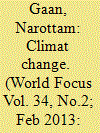

|
|
|
| 2 |
ID:
111130
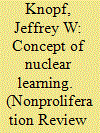

|
|
|
|
|
| Publication |
2012.
|
| Summary/Abstract |
This article seeks to elucidate the concept of nuclear learning. It explores both the "nuclear" and the "learning" aspects of the concept. On the nuclear side, it distinguishes between learning basic facts about nuclear arms and drawing inferences about the larger implications of those facts. On the learning side, it discusses three issues: whether to use the term in a normative or value-neutral manner; the difference between learning that leads to a change in means versus learning that leads to a re-evaluation of ends; and whether learning only takes place at the level of individuals or whether there can also be learning by collective entities. The article argues there is no universal best answer to these questions and that the particular concept of learning that should be employed depends on the goals of the analyst. If the goal is to reduce the chances of nuclear war, however, one type of learning that will be important to consider is whether there is shared, cross-national learning.
|
|
|
|
|
|
|
|
|
|
|
|
|
|
|
|
| 3 |
ID:
134148
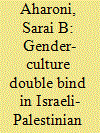

|
|
|
|
|
| Publication |
2014.
|
| Summary/Abstract |
This article investigates structural conditions for women's inclusion/exclusion in peace negotiations by focusing on the linkage between acts of gender stereotyping and cultural framing. Through a narrative analysis of semi-structured interviews with Israeli negotiators and administrators who participated in official negotiations during the Oslo peace process, I link two recent claims about how gender may affect negotiators' understandings of strategic exchange: the gendered devaluation effect and the gender-culture double bind hypothesis. Building upon postcolonial feminist critique, I argue that narratives about women and cultural difference (a) demonstrate and engage with Israeli essentialist and Orientalist discourses about Arab culture and masculinity; (b) manifest how ideas about strategic dialogue and negotiations are gendered; and (c) convey how policymakers and negotiators may use cultural claims to rationalize women's exclusion from diplomatic and strategic dialogue. Furthermore, the study implies that dominant framings of Israeli-Palestinian negotiations as a binary East-West encounter need to be replaced by a more nuanced conceptualization of cultural identity that captures contextual aspects of difference, including the existence of military power and masculine dominance.
|
|
|
|
|
|
|
|
|
|
|
|
|
|
|
|
| 4 |
ID:
139170
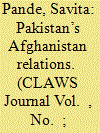

|
|
|
|
|
| Summary/Abstract |
The rise of Ashraf Ghani in Afghanistan, albeit in a power-sharing arrangement, has led to the generation of optimism in Pakistan.1 The Interior Minister of Pakistan calls it a “quantum leap in trust”.2 Pakistan was one of the first countries visited by him [including his visit to the General Headquarter (GHQ) Rawalpindi]. During his presidential poll campaign, Ghani had said, “Afghanistan and Pakistan have a choice: Do we become Asian roundabouts or do we become cul-de-sacs? The goal is a special relationship between Afghanistan and Pakistan that would resemble that of France and Germany”.3 Pakistan President Mamnoon Hussain attended the oath-taking ceremony of President Ghani which was followed by visits by the Pakistani Adviser on Foreign Affairs and National Security Sartaj Aziz and Army Chief Gen Raheel Sharif. Much bonhomie was witnessed after a trilateral ‘strategic dialogue’ held in Kabul.4 In fact, even when four Afghan officials were arrested in Peshawar, the Afghan Deputy Foreign Minister said that ties between the two countries had “entered a new phase and should not be strained by such acts”.5 Interestingly, Moeed Yusuf traces the “strategic shift” in Pakistan’s policy to the pre-Ghani period 2012.
|
|
|
|
|
|
|
|
|
|
|
|
|
|
|
|
| 5 |
ID:
104744
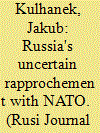

|
|
|
|
|
| Publication |
2011.
|
| Summary/Abstract |
Russia's intervention in Georgia in 2008 proved a military and diplomatic overstretch, leading to the suspension of the NATO-Russia Council and a frosty period with the North Atlantic Alliance. Moscow's recent co-operative efforts were rewarded with a 'reset' with the US and renewed strategic dialogue at the NATO Lisbon summit in 2010, but is this really a new Russia? Jakub Kulhanek argues that the much-lauded rapprochement may achieve very little progress while heralding the potential return of distrust and suspicion in NATO-Russian relations.
|
|
|
|
|
|
|
|
|
|
|
|
|
|
|
|
| 6 |
ID:
065740
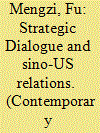

|
|
|